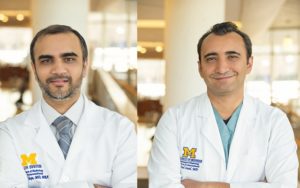
With the graduation of the first ever interventional radiology residents from a US university, Wael Saad and Minhaj Khaja discuss the importance of having a dedicated IR residency programme.
The evolution of the interventional radiology (IR) residency hit a milestone this year with the graduation of the first two IR residents in the USA, both from the University of Michigan. Nishant Patel and Michael Cline completed their IR residency training in June 2018.
The creation of an integrated primary residency in IR has long been in the works. However, a handful of programmes (at the University of Virginia, the University of Rochester, the University of Pennsylvania, and the University of Michigan, all USA) did have focused IR training programmes prior to the establishment of the IR residency at the University of Michigan. Perhaps the most consistent legacy programme of these is the University of Virginia (UVA) programme, established by Alan Matsumoto and John Fritz Angle (both of the Department of Radiology and Medical Imaging, UVA, Charlottesville, USA).
Since the approval of the IR residency in 2014 by the Accreditation Council for Graduate Medical Education, the educational paradigm in vascular and interventional radiology has been evolving at a rapid pace. Under the leadership and direction of Reed Dunnick (chair), Janet Bailey (diagnostic radiology programme director), Wael Saad (IR Division director), Bill Majdalany (IR Fellowship programme director) and Minhaj Khaja (Clinical Pathway programme director and graduate), the collaborative team strategically established the Vascular and Interventional Radiology (VIR) Clinical Pathway at Michigan in 2013, with the plan to transition to the IR residency. The VIR Clinical Pathway was established in such a way that the trainees could easily transfer into the IR residency programme of the future, and were therefore poised to be pioneers. It was modelled after the UVA-programme which we, having attended that university, were very familiar with. It should be noted that the key to this success was the collaborative relationship between IR training (Minhaj Khaja), the diagnostic radiology training (Janet Bailey), and the surgery internship training. This collaboration not only enabled the Michigan programme to be one of the first in the nation, but was noted by the Radiology Review Committee (RRC) site visit.
The first IR residency programmes were approved by the Accreditation Council for Graduate Medical Education in spring of 2015, with the first match that same year. There were only eight resident positions and a handful of programmes involved in the first year. Today, there are over 75 programmes and 130 positions each year. Having been among the first programmes approved for the IR residency and having a pre-established VIR Clinical Pathway, Michigan’s residents were able to easily transfer into the IR residency and the training paradigm of the future. The Michigan IR residency integrated programme, now with a tailored, linked surgical preliminary year, has two graduates and 16 trainees in the programme, spanning all six years of the curriculum. The latest recruited years have three integrated IR residents per class.
Cline has remained on staff at the Ann Arbor Veterans Administration Hospital, and is a faculty member at the University of Medicine and Health Sciences, Basseterre, St. Kitts & Nevis. Patel has moved out west to Denver to begin his career at Radiology Imaging Associates, USA. I am sure the entire IR community can join us in congratulating them in representing our future as pioneers and torch-bearers. We thank all of those who were vital to making this a reality at our institution, as well as nationally.
Wael Saad is a professor of Radiology, Vascular and Interventional Radiology at Michigan Medicine, the University of Michigan, Ann Arbor, USA. Minhaj Khaja is an assistant professor of Radiology at Michigan Medicine, the University of Michigan, Ann Arbor, USA.











Congratulation
This is the important step towards the world wide notion about necessity to have IR residency program.